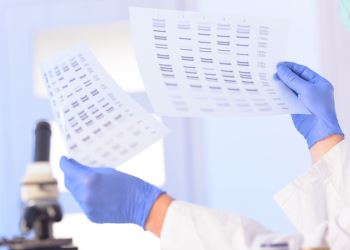You are here
Actionable Genetic Tests
 Parents desire to make the best health decisions for their children, but this can be challenging without the right resources and information. But with the right knowledge, parents are empowered to take action and make health decisions that will improve their children’s lives. Actionable genetic insights provide a way for families to identify potential disease risks and be prepared to take action.
Parents desire to make the best health decisions for their children, but this can be challenging without the right resources and information. But with the right knowledge, parents are empowered to take action and make health decisions that will improve their children’s lives. Actionable genetic insights provide a way for families to identify potential disease risks and be prepared to take action.
Actionable findings—what they are and how to get them
Genetic screens and tests are actionable when the identify risks for conditions that can be prevented, treated, or managed more efficiently, especially when detected early. Examples could be risk factors for cardiovascular disease or cancer.
Actionable genetic test results are available through both state mandated newborn genetic screening programs and through direct-to-consumer medical genetic tests. In this article we only address genetic tests for newborns and children.
State Mandated Newborn Screening
During the 1960’s, advances in genetic testing led many states to set up Newborn Screening (NBS) programs. The goal of these programs was to quickly and affordably screen all newborns, within days of birth, for severe genetic health risks known to develop in infancy or childhood. According to the NIH’s Genetic Home Reference, “Early detection and treatment can help prevent intellectual and physical disabilities and life-threatening illnesses.”1
The Recommended Uniform Screening Panel (RUSP)2 is a list of disorders that the federal Department of Health and Human Services (HHS) recommends for states to screen as part of their universal NBS programs. As of July 2018, the RUSP includes 35 conditions.
Since the 1960’s, genetic testing has becoming considerably more advanced, and some states have voluntarily adopted NBS panels of 60 or more conditions, while other states only test for the 35 conditions in the RUSP. Various reasons have been given for state-to-state differences in newborn genetic screening:
- Many states do not have sufficient funding to add all actionable conditions to their NBS.
- A primary objective of NBS is to address disease risks that require immediate action, as opposed to those that may not require care for a number of years.
- Some states may be in the process of adding actionable conditions to their tests, which is often a very lengthy process that can take years to complete.
- States have varying interpretations of what they consider an “actionable” condition appropriate for NBS.
The term “Actionable” is formally defined
In 2014, the American College of Medical Genetics and Genomics (ACMG) developed a list of genes associated with conditions that ACMG formally defined as “medically actionable”. When last updated, this list counted 59 genetic conditions3.
Though the concept of identifying “actionable” genetic conditions has been around for decades, in recent years it has become quite the buzz word in the medical genetic industry, likely due to the curation of the ACMG list. It is recommended that genetic variants on this list be reported to any patient undergoing genomic testing for traditional diagnostic purposes because of the effective, potentially life-saving, treatment options.
Direct-to-Consumer Medical Genetic Testing
Fast forward to 2020, and the Medical Genetic Testing (MGT) that is now directly available to consumers can offer sophisticated medical resources. Here are some examples of “actions” that may improve health outcomes when disease risks are identified:

- Detect disease risks early
- Prevent disease onset
- Modify diet and lifestyle
- Treat disease effectively with drugs
- Implement a clinical action plan with health management guidelines
- Join patient advocacy groups
- Participate in clinical trials
- Give and receive community support
Though not all companies that offer MGT agree with ACMG’s criteria for classifying medically actionable findings, the industry as a whole seems to have recognized the value of tests that are actionable. Most companies in the industry have launched their own, unique, “actionable panels” within the last 1-2 years.
Many companies hesitate to offer MGT to consumers for conditions that aren’t actionable, out of fear that a seemingly healthy individual may discover devastating results that indicate a high risk of developing a disease with no actions available to do anything about it.
By comparison, MGT companies feel confident in offering actionable genetic tests. Companies know that results won’t always come with good news, but they also know that the actions available are often positive and encouraging.
It is important to keep in mind, however, this warning from the National Human Genome Research Institute: “most genetic tests today are not regulated, meaning that they go to market without any independent analysis to verify the claims of the seller”4. Unfortunately, the burden is on consumers to do their homework and determine which company tests are worth the investment.
Actionable MGT of children are exceptionally valuable under the following circumstances:
- The results can speak volumes to parents who adopted a child from a foreign country with no record of newborn screening.
- Actionable findings may be important to those who delivered their newborn in a state whose NBS program is lacking one or more actionable conditions tested for in other state NBS programs.
- Children with undiscovered drug allergies are at a significant advantage in knowing which drugs to avoid.
Summary
Actionable genetic testing has significantly evolved, from a traditional physician-ordered approach to the introduction of direct-to-consumer genetic testing options. The industry’s collective appreciation for the concept of actionable findings has helped unify the offerings of various companies and has inspired them to research new actionable results. Add the pharmaceutical industry to this equation, and the number of actionable findings with effective treatment options will skyrocket.
References
- National Institutes of Health (NIH) Genetics Home Reference (GHR). What is newborn screening? web page sourced 2020-04-08
- Health Resources and Services Administration. Recommended Uniform Screening Panel. web page. Last updated 2018-07
- ACMG Statement. Recommendations for reporting of secondary findings in clinical exome and genome sequencing, 2016 update (ACMG SF v2.0): a policy statement of the American College of Medical Genetics and Genomics. Genetics in Medicine 2017; 19:249–255.
- National Human Genome Research Institute. Regulation of Genetic Tests. web page Sourced 2020-04-08


